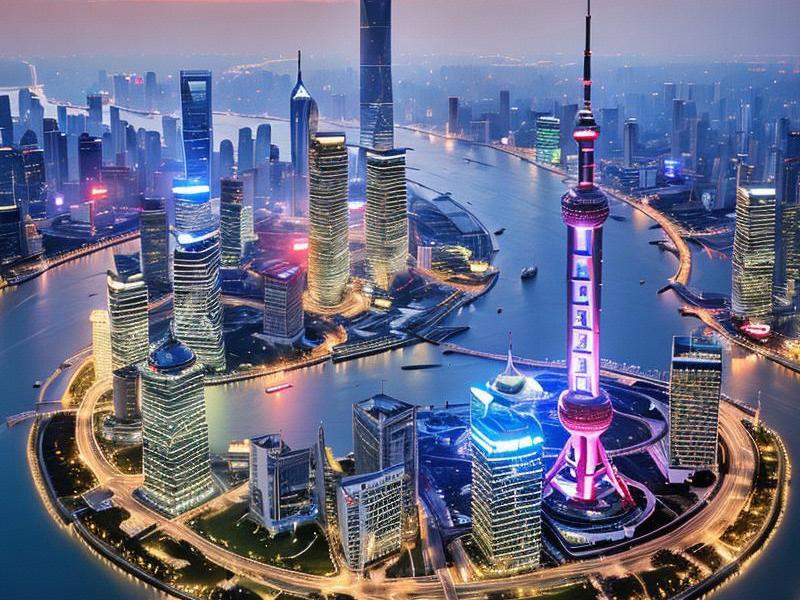
Shanghai, the bustling metropolis on the banks of the Huangpu River, has long been a symbol of China's economic prowess. Over the past few decades, this city has not only maintained its status as a financial powerhouse but has also emerged as a beacon of global innovation. From cutting-edge technology to sustainable urban planning, Shanghai's journey to becoming a global innovation hub is a testament to its forward-thinking policies and strategic investments.
The city's commitment to innovation is evident in its thriving tech ecosystem. Shanghai has established itself as a key player in the global technology arena, attracting top-tier talent and fostering a culture of entrepreneurship. The Zhangjiang Hi-Tech Park, often referred to as "China's Silicon Valley," is a prime example of this. This sprawling complex houses numerous high-tech enterprises, research institutions, and startups, all working in close collaboration to drive technological advancements.
One of the most significant factors contributing to Shanghai's success in the tech sector is its robust intellectual property protection framework. The city has implemented stringent measures to safeguard patents, trademarks, and copyrights, providing a secure environment for businesses to innovate and thrive. This commitment to protecting intellectual property has not only attracted domestic companies but has also lured international firms seeking to establish a foothold in the Chinese market.
In addition to its tech ecosystem, Shanghai's economic strategies have played a pivotal role in its transformation. The city has embraced a series of innovative policies aimed at fostering sustainable growth and attracting foreign investment. One such initiative is the Free Trade Zone (FTZ), established in 2013, which offers a range of benefits including tax incentives, simplified customs procedures, and a more business-friendly regulatory environment. The FTZ has become a magnet for multinational corporations, with many choosing to set up regional headquarters in Shanghai.
上海龙凤419是哪里的 The city's economic strategies also extend to its efforts in attracting and retaining top talent. Shanghai has implemented a comprehensive talent policy that includes offering preferential housing policies, providing subsidies for education and healthcare, and simplifying the visa application process for international professionals. These measures have made Shanghai an attractive destination for skilled workers from around the globe, further fueling the city's innovation-driven economy.
Urban planning has been another critical aspect of Shanghai's journey to becoming a global innovation hub. The city has undergone significant transformations over the years, with a focus on creating a sustainable and livable urban environment. One of the most notable projects is the Bund Revitalization Project, which aims to transform the historic Bund area into a world-class financial and cultural district. This project involves the construction of iconic skyscrapers, the development of green spaces, and the preservation of historical landmarks, all designed to enhance the city's aesthetic appeal and functionality.
Another key initiative is the construction of the Shanghai Tower, the tallest building in China and the second-tallest in the world. This architectural marvel not only symbolizes Shanghai's ambition to be a global leader but also serves as a hub for innovation and business. The tower houses state-of-the-art facilities, including research centers, co-working spaces, and event venues, all designed to foster collaboration and creativity among its occupants.
上海花千坊龙凤 Sustainability is a core principle in Shanghai's urban planning efforts. The city has set ambitious targets to reduce carbon emissions, improve air quality, and promote the use of renewable energy sources. Initiatives such as the construction of green buildings, the expansion of public transportation networks, and the promotion of electric vehicles are all part of Shanghai's commitment to creating a more sustainable future.
The city's leadership has also recognized the importance of fostering a culture of innovation among its residents. To this end, Shanghai has invested heavily in education and research institutions, ensuring that the next generation of innovators is well-equipped with the skills and knowledge needed to drive progress. The city is home to several prestigious universities and research institutes, including Fudan University, Tongji University, and the Shanghai Academy of Social Sciences, all of which play a crucial role in advancing scientific research and technological innovation.
Cultural exchange has also been a key component of Shanghai's strategy to become a global innovation hub. The city has embraced its role as a cultural melting pot, welcoming people from diverse backgrounds and fostering a spirit of inclusivity. This cultural diversity has enriched the city's innovation ecosystem, bringing together different perspectives and ideas that drive creativity and progress.
上海品茶网 Shanghai's journey to becoming a global innovation hub is not without challenges. The city faces issues such as rising living costs, traffic congestion, and environmental concerns. However, its proactive approach to addressing these challenges, coupled with its unwavering commitment to innovation, positions it well for continued success.
Looking ahead, Shanghai is poised to play an even more significant role on the global stage. The city's leaders are committed to maintaining its status as a leading financial and technological center while also addressing the pressing issues of sustainability and social equity. With its innovative policies, robust infrastructure, and talented workforce, Shanghai is well on its way to achieving its vision of becoming a global innovation hub.
In conclusion, Shanghai's transformation into a global innovation hub is a remarkable story of resilience, adaptability, and ambition. The city's advancements in technology, economic strategies, and urban planning have set a benchmark for other cities around the world. As Shanghai continues to evolve, it remains a shining example of how a city can leverage its unique strengths to drive progress and crteeaa better future for its residents and the global community.
